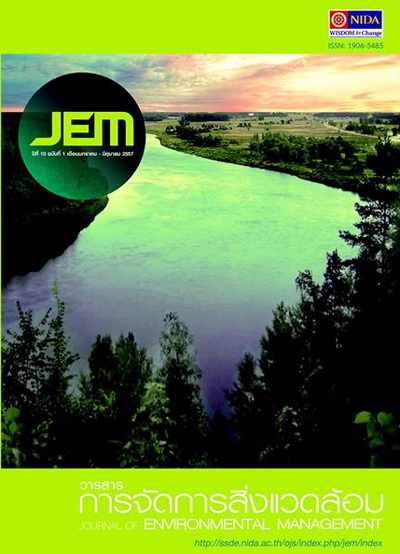การจัดการเพื่อจัดเก็บค่าธรรมเนียมบำบัดน้ำเสีย ตามหลัก“ผู้ก่อมลพิษเป็นผู้จ่าย” (Polluter Pays Principle: PPP) ที่เหมาะสมสำหรับประเทศไทย Management fee to Wastewater Treatment Storage on a Polluter Pays Principle: PPP of Thailand
บทคัดย่อ
บทคัดย่อ
ปัญหามลพิษทางน้ำและสภาพเสื่อมโทรมของคุณภาพน้ำในแม่น้ำที่สำคัญของประเทศต่างๆ มีความรุนแรงมากขึ้น เนื่องจากการระบายน้ำเสียไม่เป็นไปตามการกำหนดมาตรฐานควบคุมการระบายน้ำทิ้งจากแหล่งกำเนิด อีกทั้งความสามารถในการรองรับน้ำเสียของแหล่งน้ำและอัตราการรองรับมลพิษจากกิจกรรมต่าง ๆ มีขีดจำกัด ทำให้ต้องมีการกำหนดมาตรการด้านกฎหมาย โดยให้ความสำคัญกับการสนับสนุนให้ประชาชนมีส่วนร่วมในการแก้ไขปัญหาน้ำเสียตามหลักเศรษฐศาสตร์ที่กำหนดให้ผู้ก่อมลพิษต่อสิ่งแวดล้อมต้องรับผิดชอบจ่ายค่าเสียหายหรือค่าใช้จ่ายในการป้องกันและควบคุมมลพิษสิ่งแวดล้อม ตลอดจนทำให้สิ่งแวดล้อมกลับคืนสู่สภาพเดิม ดังนั้นบทความนี้จะแสดงถึงการใช้หลักเศรษฐศาสตร์มาช่วยในการดำเนินการเพื่อจัดเก็บค่าธรรมเนียมบำบัดน้ำเสียของประเทศอียิปต์ ประเทศฝรั่งเศส ประเทศมาเลเซีย ประเทศสิงคโปร์ และประเทศอินโดนีเซีย เพื่อเป็นแบบอย่างในการจัดเก็บค่าธรรมเนียมที่เหมาะสมสำหรับกรุงเทพมหานครและจังหวัดอื่น ๆ ตามหลัก“ผู้ก่อมลพิษเป็นผู้จ่าย” (Polluter Pays Principle: PPP) จากผลการศึกษา พบว่า
1) หน่วยงานหลักที่ควรดำเนินการจัดเก็บค่าธรรมเนียมบำบัดน้ำเสีย ควรเป็นรัฐบาลท้องถิ่นซึ่งสำหรับประเทศไทย คือ กรุงเทพมหานครและเทศบาล โดยรวมอยู่ในบิลเดียวกันกับค่าใช้น้ำประปา และ 2) การคิดอัตราการบำบัดน้ำเสีย ทั้งกรุงเทพมหานครและเทศบาล ควรคิดตามปริมาณการใช้น้ำประปา โดยทั้งกรุงเทพมหานครและเทศบาลควรมีการปรับรูปแบบการประชาสัมพันธ์ ทั้งนี้การดำเนินงานต้องได้รับความร่วมมือจากหน่วยงานที่เกี่ยวข้องและสร้างการมีส่วนร่วมของประชาชน ซึ่งจะนำไปสู่การการยอมรับและเต็มใจในการจ่ายค่าธรรมเนียมบำบัดน้ำเสียต่อไป
คำสำคัญ: การบำบัดน้ำเสีย; การจัดเก็บค่าธรรมเนียมบำบัดน้ำเสีย; หลักผู้ก่อมลพิษเป็นผู้จ่าย
Abstract
The problems of water pollution and tater quality degradation in major rivers of the country are becoming serious due to discharges of wastewater below the water quality standard and the natural limits of the holding capacity of waterways. The problems require legal measures which solicit popular participation into the acceptance of the Polluter Pays Principle. This academic article demonstrates the use of an economic principle, i.e., the Polluter Pays Principle (PPP), to assist in calculating a charge or fee for treatment of discharged wastewater in Bangkok and other provinces, with Egypt, France, Malaysia, Singapore, and Indonesia as examples. The following are recommended: 1) Local governments, such as municipalities and Bangkok Metropolitan Administration, should be responsible for collecting the wastewater treatment fee, which should be placed in the same bill as the charge for tap water usage, and 2) The wastewater treatment fee charged by municipalities and Bangkok Metropolitan Administration should be based on the amount of tap water usage. In addition, municipalities and the BMA will have to adjust their public relations work and should seek collaboration from other agencies to increase public participation, which will lead to acceptance and willingness to pay for such a fee.
Keywords: Wastewater Treatment; Wastewater Treatment Fee; Polluter Pays Principle: PPP



